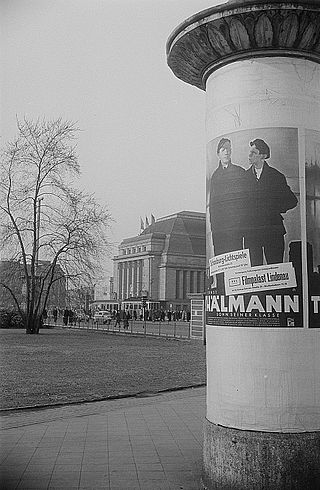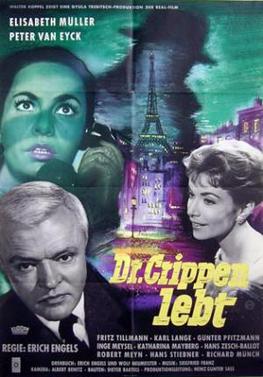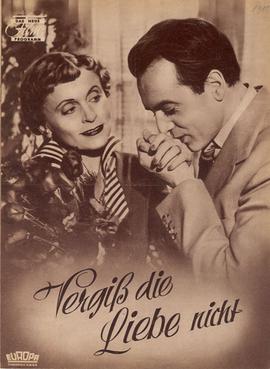UFA GmbH, shortened to UFA, is a film and television production company that unites all production activities of the media conglomerate Bertelsmann in Germany. The original UFA was established as Universum-Film Aktiengesellschaft on December 18, 1917, as a direct response to foreign competition in film and propaganda. UFA was founded by a consortium headed by Emil Georg von Stauß, a former Deutsche Bank board member. In March 1927, Alfred Hugenberg, an influential German media entrepreneur and later minister of the economy and minister of agriculture and nutrition in Adolf Hitler's cabinet, purchased UFA and transferred ownership of it to the Nazi Party in 1933.

Ernst Thälmann is an East German propaganda film in two parts about the life of Ernst Thälmann, leader of the Communist Party of Germany during much of the Weimar Republic, directed by Kurt Maetzig and starring Günther Simon in the title role. The first part, Ernst Thälmann - Sohn seiner Klasse, was released in 1954. It was followed by the 1955 sequel. Ernst Thälmann - Führer seiner Klasse.
Berolina Film was a film production company that operated in West Germany between 1948 and 1964. The company's productions were supervised by the experienced Kurt Ulrich and were based in West Berlin. The company helped launch a cycle of popular heimatfilm made in the 1950s.
Andrew Thorndike was a German documentary film director. He directed 16 films between 1949 and 1977. His 1950 documentary, Der Weg nach oben, won the Best Documentary Film at the Karlovy Vary International Film Festival in 1951. He was a member of the jury at the 5th Moscow International Film Festival. At the 11th Moscow International Film Festival in 1979, he was awarded the Honorable Prize for his contribution to cinema.

The Heart of St. Pauli is a 1957 West German musical film directed by Eugen York and starring Hans Albers, Hansjörg Felmy and Jürgen Wilke. The film is set in the St. Pauli district of Hamburg and was an attempt to capitalise on the success of Albers’ earlier starring role in Große Freiheit Nr. 7. It was made by the Hamburg-based studio Real Film and shot at the Wandsbek Studios and on location in the city. The film's sets were designed by the art directors Mathias Matthies and Ellen Schmidt.

Nora's Ark is a 1948 German comedy-drama film directed by Werner Klingler that stars Willy Maertens, Claus Hofer and Harry Meyen. It is about a young couple who go to live on a derelict boat because they lack a home.

Doctor Crippen Lives is a 1958 West German crime film directed by Erich Engels and starring Elisabeth Müller, Peter van Eyck and Fritz Tillmann. It was made at the Wandsbek Studios of Real Film in Hamburg. The film's sets were designed by the art director Dieter Bartels.

Dancing Stars is a 1952 West German musical comedy film directed by Géza von Cziffra and starring Germaine Damar, Georg Thomalla and Fita Benkhoff. It was shot at the Wandsbek Studios of Real Film in Hamburg. The film's sets were designed by the art directors Albrecht Becker and Herbert Kirchhoff.
Real Film or Real-Film was a West German film production company. It was established in 1947 in Hamburg, then part of the British Zone of Occupation. Its founders were Walter Koppel and the Hungarian Gyula Trebitsch. The company released some rubble films but gradually switched to concentrate on comedies and musicals. In 1948 an estate in Wandsbek was acquired and developed into a modern film studio, with space sometimes rented out to other companies. The company became a stable and economically successful producer in the 1950s.

Third from the Right is a 1950 West German musical crime film directed by Géza von Cziffra and starring Vera Molnar, Robert Lindner and Peter van Eyck. It was made by the Hamburg-based company Real Film at the Wandsbek Studios in the city. The film's sets were designed by the art director Herbert Kirchhoff.

The Tempelhof Studios are a film studio located in Tempelhof in the German capital of Berlin. They were founded in 1912, during the silent era, by German film pioneer Alfred Duskes, who built a glass-roofed studio on the site with financial backing from the French company Pathé. The producer Paul Davidson's PAGU then took control and constructed a grander structure. The First World War propaganda drama The Yellow Passport, the historical comedy Madame DuBarry and the expressionist 1920 silent film The Golem were made there by PAGU.

Don't Forget Love is a 1953 West German romantic comedy film directed by Paul Verhoeven and starring Luise Ullrich, Paul Dahlke and Will Quadflieg. It was shot at the Wandsbek Studios as well as on location in Hamburg and Innsbruck. The film's sets were designed by the art directors Hermann Warm and Heinrich Weidemann.

The Man in Search of Himself is a 1950 West German comedy crime film directed by Géza von Cziffra and starring Vera Molnar, Wolf Albach-Retty and Petra Trautmann. The film was made at the Wandsbek Studios in Hamburg. The film's sets were designed by the art director Herbert Kirchhoff. It was shot on location in Hamburg, the Bavarian Alps, and the French Riviera.

Heart Without Mercy is a 1958 West German crime film directed by Viktor Tourjansky and starring Barbara Rütting, Hansjörg Felmy and Werner Hinz.
Deutsche London Film or Deutsche London-Film was a West German film distribution company active from 1940 to 1956. Handling both domestic productions and imports, and concentrating on popular film genres, it established itself as one of the bigger distributors. This took place during the economic recovery of the German film industry in the post-Second World War period, as audiences reached peak numbers by the mid-1950s.

A Love Story is a 1954 West German historical romantic drama film directed by Rudolf Jugert and starring Hildegard Knef, O.W. Fischer and Viktor de Kowa. It was shot at the Wandsbek Studios in Hamburg and on location in Celle and Umgebung. The film's sets were designed by the art directors Erich Kettelhut and Johannes Ott. It was produced by Erich Pommer's independent company Intercontinental Film. It was part of the tradition of Prussian films, which had enjoyed great popularity in the Weimair and Nazi eras.











